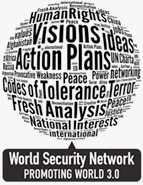Inside Jordan: Hubertus Hoffmann meets the Islamic Rose and a Prince of Wisdom and Tolerance

When beautiful Queen Rania of Jordan enters the room, with King Abdullah IInext to her, she charms all her guests and represents the new Arab world, full of positive energies, women's power, optimism, friendship and openness to foreigners. Rania is the Rose of Palestine and Jordan, the Rose of Islam.She is a Palestinian lady. Her parents lived in Kuwait, but had to flee away from the armies of Saddam Hussein to Amman, where she met Abdullah as an employee of the US-based Apple Computer Company.
Talking to WSN at a dinner in their summer palace in Aqaba on the Read Sea, just at the border to Israel and only few miles away from the city of Elat, she emphasizes the need for mutual respect and understanding. She is the charming and cosmopolitan side of Palestine, Jordan and Islam in the exceptional personage of a graceful Queen.
Now there is real and stable peace between Jordan and Israel after both countries fought the Seven Days War in 1967 – during which Jordan lost the West bank to Israel – and late King Hussein signed a peace treaty with Israel in 1994. Now Jordan is pressing hard for a peace agreement between Palestine and Israel.
If you want to know how the Holy Land between Egypt in the South, the Mediterranean Sea in the West, Lebanon and Syria in the North and the Arabic Peninsula in the East may look like in the year 2050 you only have to look at the very old map of this region in the Byzantine St. Georges Church in the Jordanian mountain city of Madaba from the year 560 AD.
The originally 16x6-metre mosaic map of the Holy Land shows Jerusalem, the River Jordan, Jericho, Nablus, Hebron, the Nile Delta and southern Lebanon – 1448 years ago – as one cultured land, with different tribes, a strong Christian and Jewish influence, flourishing trade from China to Europe; this is a region which is cosmopolitan and mainly respectful to other religions and cultures. No national or religious borders exist but only different rulers. It could be the blueprint for a multi-national and multi-religious new peaceful Holy Land including a peaceful Jewish state of Israel and an independent Palestine.
The history of the Holy Land is also a strong and clear historical signal against the self-styled Islamists who reduce this religion – contrary to the original teaching of the Prophet – as totalitarian and not as pluralistic, peaceful and respectful towards Judaism and Christianity like it was in the pre-Islamic and early Islamic period and for many hundreds of years later.
The spectacular view from Mount Nebro, a Christian holy site where Moses died, from the high mountains of Jordan over the Dead Sea to the West Bank and Israel shows how tiny these disputed territories are and how peaceful they could be after agreements on peace and cooperation.
Israel and Palestine are only small mosaic stones in the region who are bound together but until now have failed to find a compromise for peace. The extreme positions of a conquest of as much Holy Land as possible by radical Zionists on the one hand, and the wish of a return of all Palestinians who left what is now Israel on the other, contradict each other and have blocked a peace agreement for now 60 years.
Member of the Israeli Knesset and peace activist Yossi Beilin, former chairman of Meretz-Yachad and Minister of Justice under Ehud Barak, explains why. In his opinion, scepticism rules. When you are sceptical you are always right when peace fails, and nobody will complain in case you are wrong. So it is a comfortable position for both sides of political leaders in Israel and Palestine. He talks about a window of opportunity in Israel and Palestine as more nationalist politicians could be elected if peace now fails again. His proposal is to act now and compromise on both sides: divide Jerusalem between Israel and Palestine, refuse the right of return for Palestinians into Israel as otherwise the Jewish state would lose its identity, ban all parties like Hamas which support terrorism from elections, make peace with Syria including giving back the Golan Heights – which in modern warfare are not necessary any more for defence purposes – and sign a cease-fire with Hamas.
Knesset MP Yossi Beilin: Peace Plan for Israel-Palestine - an exclusive WSN TV interview
Knesset MP Yossi Beilin: Respect needed for Peacemaking - an exclusive WSN TV interview
Dr. Yossi Beilin is one of five members of the Meretz-Yachad party in the Israel parliament, the Knesset. He is best known as a promoter of reconciliation between Israel and Palestine and as a prominent supporter of the 1993 Oslo accords and the Geneva initiative. He served in the government as Deputy Foreign Minister, Minister of Economy and Planning, Minister of Justice and Minister in the office of the Prime Minister.

A former member of the Palestine cabinet told WSN that several mistakes had been made in the past. Israel and Palestine can work together on concrete cooperation e.g. in energy and water supply. The radical Mullahs and the radicals Rabbis have to be confined to religion and not politics.
Meeting people in Jordan makes it crystal clear: the longer there is no political solution for Palestine, the more powerful the radicals and Tehran become in this region. It is a bleeding wound in the Arab states and even after 60 years dominates the news and creates frustration in the masses of the Muslim world. And: a solution cannot come with military means but only with political means and a process of reconciliation. Too much is spent on security and weapons and too little on education, new jobs and hope.
Diversity and not narrow minded religious unilateralism and totalitarism is the rich history and the main message of the Great Holy Land.
The totalitarian concept of radical Islamism – as represented by Hamas and Hezbollah and big brother Tehran in the background – is unnatural for the Holy Land as any claim of extreme Zionists that the whole Holy Land belongs to only them.
This land is not my land – it belongs to all mankind and all the Abrahamian religions – Jews, Christians and Moslems.
It is all together world heritage.
Therefore the concept to share this Holy Land and in a first step separate parts but in a second move closer together as new peace partners and friends is the message of the many thousands of historical sites from Jordan to Palestine, Israel, Egypt to Lebanon and Syria.
And another main message of this cultural land to its people there is: As-Salaamu ’Alaykum! Peace upon you! Shalom! May peace be with you! - not engaging in violence.
The peaceful concept of Jordan is fully in line with the history and historical message of the Holy Land.
During a dinner with the active couple Dr. Rana Dajani from the Hashemite University and her husband Col. ret. Mohammad Aeshan in Amman they mentioned the important psychological factors of peacemaking: the people in the region are depressed by 60 years of bad news. You must make them proud again and success stories are needed. The region needs scholars, writers, journalists and teachers who make the intellectual voice of the people heard. So they started www.lovereading.org, which as an NGO promotes the love of reading among children and gives them access to literature.
General ret. Mohammad K. Shiyyab from the Cooperative Monitoring Center and Dr. Mohammad Al-Momani from the Regional Human Security Center represent the new class of reliable officers who protect their homeland against the new threats. For these Muslim patriots a forward looking security policy and a containment of radicals are in the national interest of Jordan.
The region of the Holy Land needs a new kind of Marshall Plan from the wealthy Gulf States. According to the World Bank 100 million young people need new jobs by the year 2015. Organized by the Gulf Cooperation Council (GCC) the oil-rich countries should pool now out of their windfall super profits of several hundreds of billions of dollars an “Arab Education and Development Initiative” for their Muslim brothers and sisters in the North thus containing the increasing influence of the Shiites and radical Islam.
Like the plan of the U.S. in the 1950’s, and under the leadership of Saudi Arabia, the United Arab Emirates, Kuwait and Qatar, the GCC should fund this new initiative with approx. USD 100-200 bn, or otherwise lose its influence to its arch enemies, the radical Mullahs in Tehran. With only military means the Gulf States cannot contain or win the battle with Iran. Until now they and the GCC lack the design of a credible containment policy and think mainly in military terms like the U.S.
Dr. Bassem Awadallah, the Chief of the Royal Hashemite Court of the King of Jordan, sees an increasing influence of the radical forces from Tehran in the region. Jordan has achieved a lot in the past but needs to improve even more to give its dominant young inhabitants employment, hope and a positive future.

Dark clouds are looming in the local Jordanian skies as the top decision-making post in the Jordanian Islamic movement has gone to one of the most hawkish pro-Hamas leaders, Dr. Haman Said, who was elected general supervisor of the Muslim Brotherhood Movement these days. Said has defeated the doves in his movement and he is the first leader from Palestine. This will end 60 years of a cordial relationship between the Brotherhood and the Amman government.
Jordan is sandwiched between the conflict in Palestine and Iraq with the burden of too many refugees – including remaining Palestinian refugee camps – as destabilizing factors in daily life. Now a third threat infiltrates Jordan: the dark clouds from a theocratic Islamist movement empowered and financed by Tehran. Still the moderate and pro-Western government can maintain control, i.e. by appointing the Imams in the Mosques and controlling their preaching. But, for how long? Jordan only will have a chance under two conditions: a quick solution in Palestine/Israel within 2008-2010 and more jobs for the many well trained young people in the country.
His Royal Highness Prince el Hassan bin Talal of the Hashemite Kingdom of Jordan, who hosted with his wife Princess Sarvath a dinner in their residence in Amman to discuss the WSN project The Human Codes of Tolerance and Respect, argued that diversity is the history and fact of this region and a promotion of respect and tolerance is essential for the future. This deep thinker, former President of the Club of Rome, has initiated the Royal Institute for Inter-Faith Studies which cooperates with WSN in the Codes of Tolerance and Respect project.
For Prince el Hassan a promising future begins with the recognition that diversity and unity are not incompatible. The region needs shared consciousness, mutual interests and the recognition of human dignity, a politics of inclusion, dialogue and exchange and ethnic and religious harmony.
“Islam, like Christianity, teaches dialogue, engagement and tolerance. The communities need an urgent call for responsible religiosity among Muslims. As Muslims, Jews and Christians, we are bound by a common heritage of spiritual struggle under one God and have a common DNA of faith.” This is the message of this descendant of the prophet Muhammad, a wise and for me also holy man in the Holy Land who represents the best spirit you can find in this glorious part of the globe.








Comments